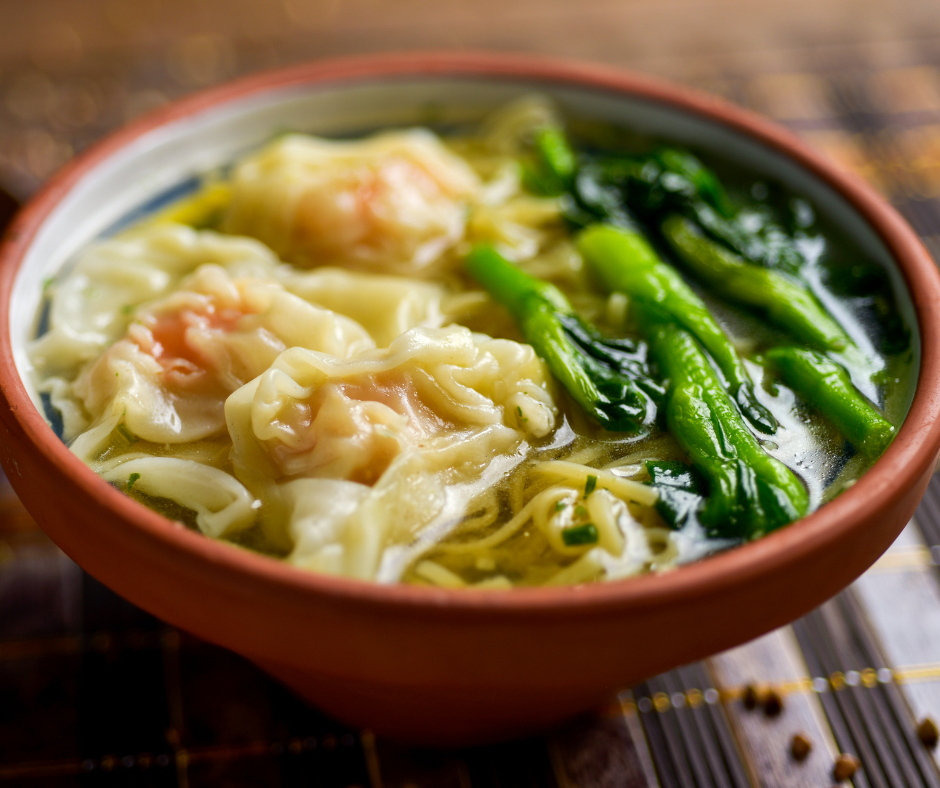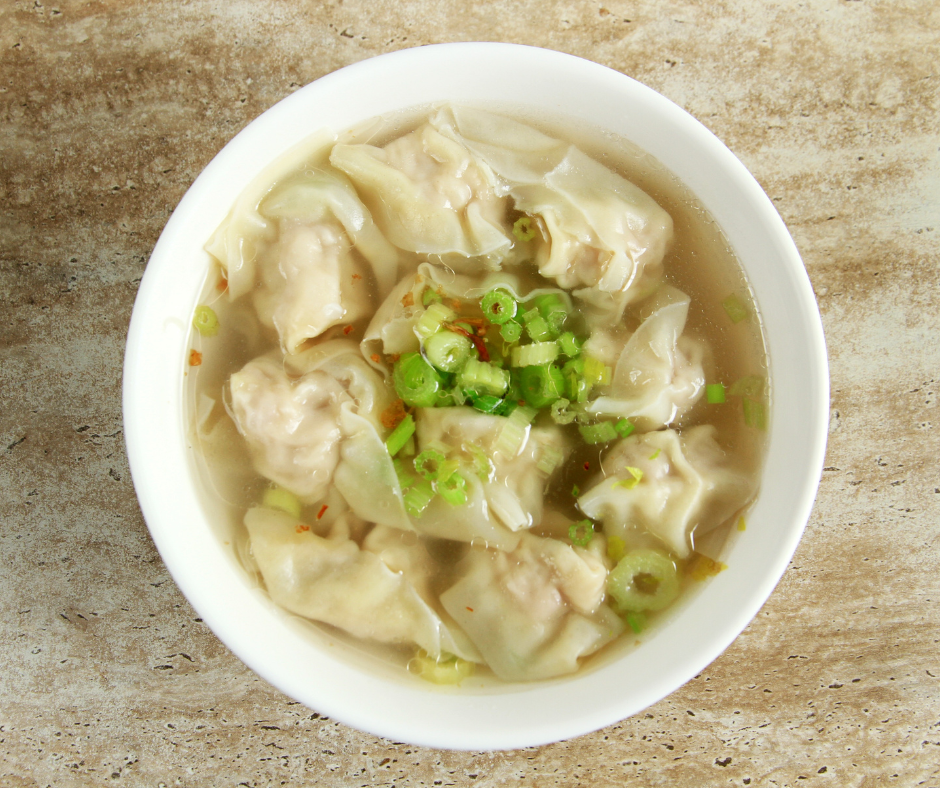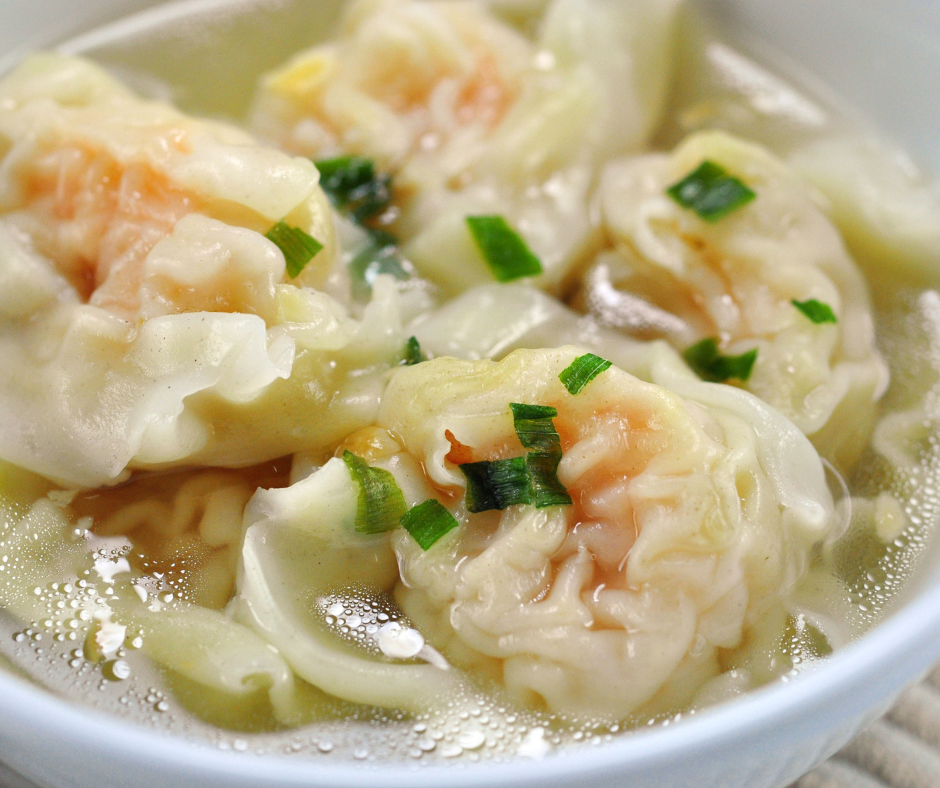Introduction
Wonton soup is a popular dish in many Chinese cuisines, known for its delicate dumplings and flavorful broth. But Is Wonton Soup Healthy? In this article, we will analyze the nutritional aspects of wonton soup to help you understand its impact on your diet and overall health.
Misconceptions About Chinese Food And Its Healthiness
Chinese food often has an unhealthy reputation due to misconceptions surrounding certain dishes. However, it’s important to remember that Chinese cuisine is incredibly diverse, with many nutritious and wholesome options. While some dishes may be high in sodium or unhealthy fats, it’s not fair to generalize the entire cuisine.
Exploring The Nutritional Aspects Of Wonton Soup
Wonton soup contains key ingredients: wontons, broth, and optional additions like vegetables or protein. Let’s break down the nutritional aspects of each component:
- Wontons: Small dumplings typically filled with minced meat, usually pork and seasonings. While they contain calories and carbohydrates, the nutritional profile can vary depending on the recipe and cooking method. Steamed or boiled wontons tend to be healthier options compared to deep-fried ones.
- Broth: The broth in wonton soup is generally light and flavorful, although it can vary depending on regional preferences. The broth is typically low in calories but can be high in sodium. If you are watching your sodium intake, it may be advisable to consume wonton soup in moderation or look for healthier versions with reduced sodium broths.
- Additional Ingredients: Wonton soup often includes vegetables like bok choy, mushrooms, or bean sprouts, which add essential vitamins, minerals, and dietary fiber. Some variations also include protein sources like shrimp or chicken, which contribute to the overall nutritional content of the soup.
To make wonton soup a healthier option, consider the following tips:
- Opt for steamed or boiled wontons instead of fried ones to reduce unhealthy fats.
- Choose a broth with reduced sodium or make your own with low-sodium ingredients.
- Load up on vegetables to increase the nutritional value of the soup.
- Control portion sizes to manage calorie intake.
In conclusion, wonton soup can be healthy and satisfying, especially when prepared with nutritious ingredients and mindful cooking techniques. Like any food, moderation is key, and incorporating a variety of nutritious dishes into your diet is essential for overall health and well-being.
Macronutrient Content
Fat, Protein, And Carbohydrate Content Of Wonton Soup
Wonton soup, a popular Chinese dish, is typically made with wontons, which are small dumplings filled with ground meat or seafood and a flavorful broth. If you are wondering about the nutritional aspects of wonton soup, here’s what you need to know.
When it comes to macronutrients, wonton soup is relatively low in fat. The fat content in wonton soup varies depending on the type and amount of meat used in the filling. Generally, wonton soup provides a moderate amount of protein, which is essential for building and repairing tissues in the body. The carbohydrate content mainly comes from the wonton wrappers and any added vegetables or noodles.
Sugar And Dietary Fiber Content
Wonton soup typically contains very low levels of sugar. The main source of sweetness in wonton soup may come from the natural sugars found in vegetables or added sweeteners in the broth. However, the overall sugar content is usually minimal.
Regarding dietary fiber, wonton soup may not provide a significant amount. The primary sources of fiber in the soup are the vegetables included. While the wonton wrappers or noodles may contain some fiber, it is generally not substantial.
It is important to note that the exact nutritional content of wonton soup can vary depending on the recipe and ingredients used. Therefore, if you have specific dietary concerns or restrictions, it is always best to check the nutritional information of the wonton soup you consume or speak with a healthcare professional.
In conclusion, wonton soup can be healthy and nutritious, especially if you opt for a lower-sodium broth with plenty of vegetables. It is a flavorful and comforting meal that can provide a balanced combination of protein, carbohydrates, and essential nutrients. However, as with any dish, moderation and mindful portion control are key to maintaining a healthy diet.
References:
Micronutrient Content
Wonton soup is a popular Chinese dish that consists of wontons, a type of dumpling, served in a flavorful broth. But is wonton soup healthy? Let’s look closer at the nutritional aspects of wonton soup to find out.
Vitamin And Mineral Content Of Wonton Soup
Wonton soup can be a good source of various vitamins and minerals. The exact nutrient content may vary depending on the ingredients and cooking method. However, here are some common nutrients found in wonton soup:
- Protein: Wonton soup usually contains a good amount of protein due to the presence of wontons filled with minced meat or seafood.
- Iron: Wonton soup can provide iron, a mineral important for transporting oxygen in the body.
- Vitamins: Wonton soup may contain vitamins such as C, A, and various B vitamins, depending on the ingredients used in the broth and fillings.
- Calcium: Some versions of wonton soup may include ingredients like bok choy or other leafy greens, which can contribute to the calcium content.
Contribution To Overall Health
While wonton soup can provide some beneficial nutrients, it is also important to consider the overall composition of the dish. Here are a few things to keep in mind:
- Sodium: Wonton soup can be high in sodium due to using soy sauce or other condiments. Excessive sodium intake may contribute to high blood pressure, so consuming wonton soup in moderation is important.
- Calories: The calorie content of wonton soup can vary depending on the ingredients used and portion size. Wontons may be higher in calories due to the dough and fillings, so it’s important to consider portion control.
- Other ingredients: Wonton soup may contain other ingredients, such as vegetables or mushrooms, which can add to its nutritional value. Including a variety of vegetables and lean proteins can help enhance the overall healthfulness of the soup.
In conclusion, wonton soup can provide beneficial nutrients such as protein, iron, and vitamins. However, it is important to be mindful of the sodium and calorie content and the ingredients used. Enjoying wonton soup as part of a balanced and varied diet can contribute to a healthy lifestyle.
Caloric Information
Wonton soup is a popular Chinese dish that consists of wontons, which are small dumplings filled with meat or vegetables, served in a flavorful broth. While it may be delicious, many wonder, ‘Is Wonton Soup Healthy?’. Let’s analyze the nutritional aspects of wonton soup to find out if it is a good option for those watching their calorie intake.
Calorie Count Of Wonton Soup Per Serving
The calorie content of wonton soup can vary depending on the size of the serving and the ingredients used. On average, a serving of wonton soup contains around 200-300 calories. The number of wontons and the type of broth used can affect the overall calorie count. Wontons themselves are relatively low in calories, but the sodium content in the broth can add up.
Comparison To Recommended Daily Calorie Intake
To determine if wonton soup is a healthy choice, it is important to consider your individual calorie needs. The recommended daily calorie intake varies based on age, gender, and activity level. On average, a moderately active adult woman needs around 2,000 calories daily, while a moderately active adult man needs around 2,500 calories daily.
If we compare the calorie count of a serving of wonton soup to the recommended daily calorie intake, it is clear that it can be a reasonable choice. A serving of wonton soup typically provides around 10-15% of the daily calorie needs for an average adult. However, it’s important to note that wonton soup should be enjoyed as part of a balanced diet, considering other meals and snacks consumed throughout the day.
In addition to calories, it’s also important to consider the nutritional value of wonton soup. Wontons are typically made with a combination of protein (such as pork or shrimp) and vegetables, providing a good source of nutrients. The broth can also contribute to your daily fluid intake. However, the sodium content in the broth should be monitored, especially for individuals with high blood pressure or other health conditions.
In conclusion, wonton soup can be a healthy choice as part of a balanced diet, especially when consumed in moderation. It is relatively low in calories and can provide a good source of protein and vegetables. However, it’s important to be mindful of the broth’s portion sizes and sodium content. As with any food, moderation and variety are key to maintaining a healthy and balanced diet.
Is Wonton Soup Healthy? – Health Benefits Of Wonton Soup
Wonton soup is a popular Chinese dish that consists of wonton dumplings, often filled with meat or vegetables served in a flavorful broth. But is wonton soup healthy? Let’s take a closer look at the nutritional aspects of wonton soup.
Boosting Energy Levels, Metabolism, And Muscle Production
Wonton soup can be a good energy source due to its carbohydrate content. The dumplings are made with dough that provides complex carbohydrates, which are essential for providing a sustained release of energy. Additionally, wonton soup contains protein from the filling, which is crucial for muscle growth and repair. Protein is also known for boosting metabolism, helping with weight management, and providing a feeling of satiety.
Providing Essential Nutrients And Vitamins
Wonton soup can also be a source of essential nutrients and vitamins. The filling in wonton dumplings often includes vegetables, such as cabbage, carrots, and mushrooms, which are rich in vitamins and minerals. These vegetables provide vital nutrients like vitamins C, A, and potassium, which are important for maintaining a healthy immune system, vision, and overall well-being. The broth may also contain herbs and spices, contributing to the soup’s nutritional value.
While wonton soup can offer some health benefits, it’s important to be mindful of portion sizes and ingredients. Some wonton soups may be high in sodium due to soy sauce or other seasonings. Choosing broth options with lower sodium content is a good idea, or asking for a reduced-sodium version when dining out is a good idea. Additionally, leaner protein options, such as chicken or shrimp, can help keep the fat content in check.
In conclusion, wonton soup can be a nutritious and satisfying meal option if prepared with quality ingredients and consumed in moderation. It provides a balance of carbohydrates, protein, and essential nutrients. However, considering the overall nutritional content and choosing options that align with your dietary needs and goals is always a good idea.
FAQ: Is Wonton Soup Healthy? Analyzing the Nutritional Aspects of Wonton Soup
Q: What is the macronutrient profile of wonton soup?
A: According to the USDA database, wonton soup is composed of carbohydrates, protein, fat, and fiber. The exact breakdown can vary, but it typically contains a combination of these macronutrients.
Q: What is the Carbohydrate Quality Score of wonton soup?
A: The Carbohydrate Quality Score of wonton soup is 0.0/100, indicating that it is considered a low-quality carbohydrate food. This score is based on data analysis and takes into account the composition of fiber, starch, and sugar in the soup.
Q: How much dietary fiber does wonton soup contain?
A: Wonton soup typically contains 5 grams of dietary fiber per serving. The majority of the carbohydrate content in wonton soup comes from complex carbohydrates, with the fiber contributing to its overall nutritional value.
Q: What is the fat content of wonton soup?
A: Wonton soup contains approximately 0.1 grams of saturated fat per serving. It is a relatively low-fat food option.
Q: Does wonton soup have cholesterol?
A: Yes, wonton soup typically contains 9.6 milligrams of cholesterol per serving. It’s important to monitor cholesterol intake, especially for individuals with specific dietary concerns.
Q: What are the vitamin and mineral contents of wonton soup?
A: A serving of 241 grams of wonton soup provides approximately 2.41 micrograms of vitamin A, 1.7 milligrams of vitamin C, 0.00 micrograms of vitamin D, 0.51 milligrams of iron, 12.05 milligrams of calcium, and 77 milligrams of potassium. These nutrients contribute to the overall nutritional value of the soup.
Q: Which food category does wonton soup belong to?
A: Wonton soup belongs to the soup food category. Its nutrient composition and characteristics are typically associated with this food group.
Q: How many calories are there in wonton soup?
A: Wonton soup contains approximately 31 calories per 100 grams serving size. The calorie content may vary slightly depending on the specific recipe used.
Q: Is wonton soup considered a healthy option?
A: Wonton soup can be a healthy option when consumed as part of a balanced diet. It contains a combination of macronutrients and offers some essential vitamins and minerals. However, it’s essential to consider portion sizes and the overall dietary context to determine its suitability for individual health goals.
Conclusion
Now you should know the answer to ‘Is Wonton Soup Healthy?’. Wonton soup can be a healthy option if consumed in moderation and made with nutritious ingredients. It is a low-calorie and protein-rich soup that can be a part of a balanced diet. However, the nutritional value may vary depending on the ingredients and cooking methods.
Is Wonton Soup A Healthy Option?
When examining the nutritional aspects of wonton soup, it is important to consider the ingredients. Wontons are typically made with ground meat (such as pork or shrimp) and seasonings wrapped in a thin dough. The soup broth is often made from a combination of chicken or vegetable stock, adding flavor and depth to the dish.
While wonton soup can be a good source of protein, it is also important to note that it can be high in sodium. This is due to the broth’s use of stock and soy sauce. High sodium intake can contribute to health issues such as high blood pressure. Choosing low-sodium options or making homemade wonton soup to control the sodium content is advisable.
Wonton soup can also be a good source of vegetables, depending on the recipe. Vegetables like bok choy, spinach, and mushrooms can be added to enhance the soup’s nutritional value. These provide essential vitamins, minerals, and fiber, making the soup more nutritious.
Incorporating Wonton Soup Into A Balanced Diet
To make wonton soup a healthier option, there are a few considerations to keep in mind:
- Pay attention to portion sizes: Limit the number of wontons and control the amount of broth consumed to manage calorie intake.
- Opt for whole wheat or gluten-free wrappers: Choose wonton wrappers made from whole wheat or gluten-free ingredients to increase the fiber content and cater to dietary restrictions.
- Use leaner meats: Opt for leaner meat options like chicken or turkey instead of fatty cuts like pork.
- Homemade is best: Making wonton soup from scratch allows you to control the ingredients and adjust the seasoning and sodium levels to your preference.
As with any food, moderation is the key to incorporating wonton soup into a balanced diet. Enjoying it and other nutritious foods can contribute to a healthy and well-rounded diet. Wonton soup can be a tasty and nutritious addition to your meals by making mindful choices and being conscious of portion sizes.



